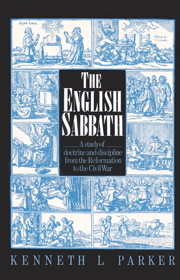Book contents
- Frontmatter
- Contents
- Acknowledgements
- Abbreviations
- 1 The case for a reappraisal
- 2 Medieval sabbatarianism and Reformation reaction
- 3 Early Elizabethan sabbatarianism: 1558–82
- 4 Late Elizabethan and Jacobean sabbatarianism: 1583–1617
- 5 The Book of Sports controversy: 1617–18
- 6 The 1620s: continued consensus
- 7 The sabbatarian controversy
- Epilogue
- Appendix
- Bibliography
- Index
5 - The Book of Sports controversy: 1617–18
Published online by Cambridge University Press: 23 November 2009
- Frontmatter
- Contents
- Acknowledgements
- Abbreviations
- 1 The case for a reappraisal
- 2 Medieval sabbatarianism and Reformation reaction
- 3 Early Elizabethan sabbatarianism: 1558–82
- 4 Late Elizabethan and Jacobean sabbatarianism: 1583–1617
- 5 The Book of Sports controversy: 1617–18
- 6 The 1620s: continued consensus
- 7 The sabbatarian controversy
- Epilogue
- Appendix
- Bibliography
- Index
Summary
The Book of Sports controversies of 1617 and 1618 are perhaps the most compelling events used in support of the received account of English Sabbatarianism. The 1617 Lancashire controversy seems straightforward and the implications obvious: James returned from Scotland and while passing through Lancashire quashed an order issued by ‘puritan’ magistrates which unlawfully restricted Sunday recreations. His preamble to the declaration lends support to the common interpretation of this controversy, for he explained that in his progress through Lancashire he rebuked ‘some puritanes and precise people and took order that the like unlawfull cariage should not bee used by anie of them hearafter in the prohibitinge and unlawfull punishinge of our good people for usinge theire lawfull recreations and honest exercises upon sondaies and other holidaies after the afternoone sermone or service’. Roger Richardson in his study of conflicts between Chester diocesan authorities and puritans stated that ‘there is no doubt… that the Declaration of Sports was designed to weaken the puritan position and to undermine the authority of preachers’. Dr Richardson's conclusion is quite accurate – but not for the reasons he gives. The notion that secular and ecclesiastical authorities were hostile towards Sabbatarian discipline which puritans were using as a ploy for moral reforms is based on a series of assumptions which have been shown to be untenable. If the restrictions, which were drafted by Bishop Thomas Morton and approved by James, are studied without reference to the king's preface, they differ little from the usual regulations found in secular and ecclesiastical documents – except for the harsh prohibition on recusants using Sunday sports.
- Type
- Chapter
- Information
- The English SabbathA Study of Doctrine and Discipline from the Reformation to the Civil War, pp. 139 - 160Publisher: Cambridge University PressPrint publication year: 1988



